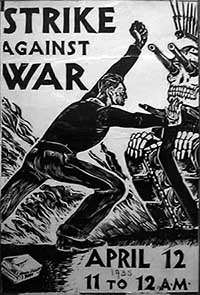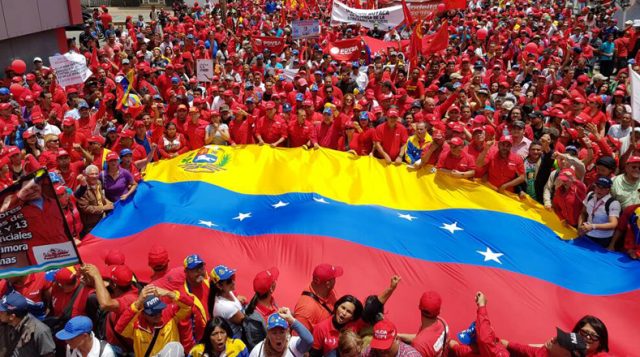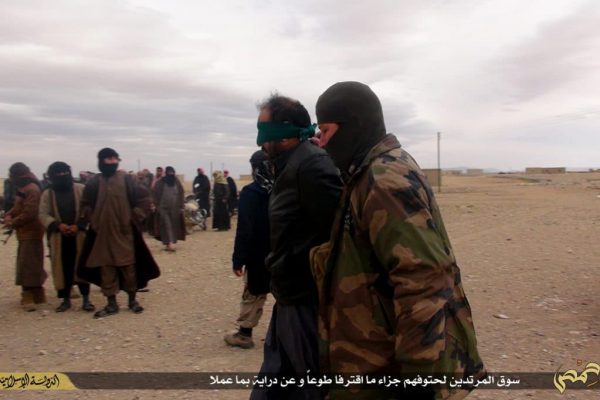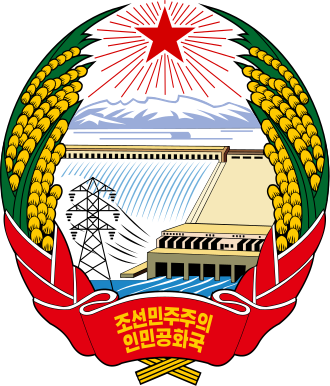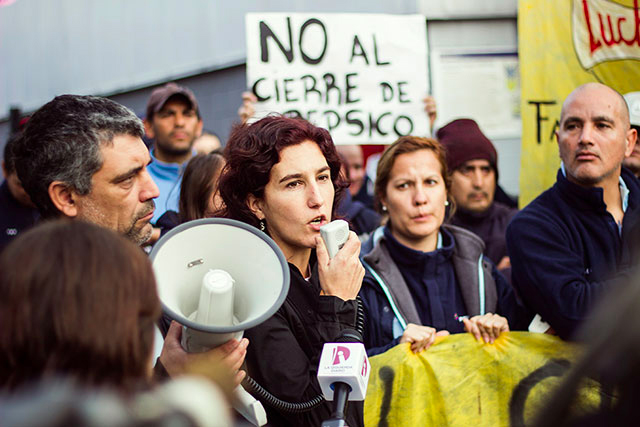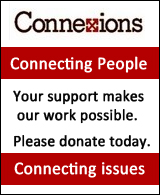Other Voices: The Connexions Newsletter
August 27, 2017
This Issue: Official Enemies
We are never left in any doubt about who our enemies are. The word goes out from the United States that a certain country is a dictatorship which abuses human rights, supports terrorism, and poses a terrible threat to the U.S. and to the world. The mainstream media then swing into action with military precision and flood us with stories, images, and commentary about how dreadful country ‘X’ is. The U.S. and its client states – also known as its ‘NATO allies’ – then move into action with a standard package of sanctions and forms of pressure, which may include economic warfare, military threats, and measures to lay the groundwork for a coup via clandestine contacts with opposition leaders and those elements of the military command who have been on the CIA payroll for years. When regime change is the goal, any method, from buying an election to military invasion, is acceptable.
There is also no doubt that ostensible reasons for branding a country as an official enemy are never the real reasons. One clear indication of this is the way a particular leader or government can be an ally one day, and an enemy the next. Saddam Hussein’s Iraq was an American ally, showered with favours and military hardware, until the day Saddam disobeyed the U.S. and took over the Kuwaiti oil fields. Suddenly the U.S. discovered that Hussein was a dictator who didn’t respect human rights, and invaded Iraq. It was a similar story in Panama, where President Manuel Noriega, a brutal thug and known drug dealer, was a trusted U.S. ally who was on the CIA payroll for years. When Noriega got too greedy and started stealing from U.S.-owned businesses, the U.S. invaded and overthrew him, killing a few thousand people in the process. It was a similar story with Assad’s Syria, which served the U.S. as a clandestine location to which it sent prisoners to be tortured (e.g. Canada’s Maher Arar). When its strategy in the Middle East changed, the U.S. suddenly discovered the Assad was a nasty dictator who tortured his enemies, and who had to be overthrown.
The standard pretexts for demonizing a particular country would be laughable if the results weren’t so grim. For example, the U.S. government and the house-trained media which spread its message would have us believe that Venezuela, a country which regularly holds internationally monitored, closely contested, elections, is a dictatorship which needs to be overthrown, while countries like Egypt, Israel, the Philippines, and Saudia Arabia, whose jails are overflowing with political prisoners, are stalwarts of the free world.
In this issue of Other Voices, we go beyond the mainstream media to look at the complex realities and histories of the current group of official enemies: Venezuela, North Korea, Syria, and Russia. These articles don’t suggest that there is nothing to criticize about these states. There is no doubt that North Korea and Syria, for example, are brutal dictatorships. It is nevertheless possible, as one article suggests, that many people in Syria, faced with the stark choice of a secular dictatorship or rule by the Islamic state or Al-Qaeda, would choose the existing state. North Korea may be a dictatorship, but its international policies have a core of rationality: asking for negotiations and guarantees on non-intervention, while maintaining a military strong enough to deter an American attack.
The ultimate conclusion these articles point to is this: war is not a solution, and U.S.-NATO intervention in other countries invariably makes things worse.
As always, we invite you to share this newsletter with your friends. You can forward this email, or send them the link to the Other Voices home page on the Connexions website at www.connexions.org/Media/CxNewsletter.htm.
If you'd like to subscribe and receive this newsletter by email every three weeks, please use this form.
Your feedback is appreciated - and so are donations to keep us doing what we're doing!

Topic of the Week
Anti-War Movement
Most people don’t want war, but does an anti-war movement still exist? Most importantly, does it exist in the countries which are using their military might to inflict war on the peoples of other countries? Why, with wars going on in may parts of the world, is the anti-war movement in the west so weak and almost invisible? What can we learn about past movements against war? Explore resources on Connexions on the anti-war movement here.
This Week on Connexions.org
The Venezuelan Opposition does not want Democracy or Elections
The Bolivarian Revolution in Venezuela is facing its most challenging times. The right-wing opposition, backed by the United States, is engaged in a full-blown regime change campaign, with violent protests occurring daily and resulting in over 50 casualties. The chavista supporters of the government have also taken to the streets in defence of the Bolivarian Revolution, and President Maduro surprised everyone by calling for a Constituent Assembly. Jorge Martín, the secretary of the "Hands Off Venezuela" solidarity campaign, gives his understanding of the situation and where it might lead. He discusses how western media are distorting the reality and presenting a one-sided picture, the role of international solidarity, the lack of progress made by the opposition and where things might go from here. Read more
Keywords: Bolivarian Socialism - Venezuela
What Corporate Media Never Tells You about North Korea
There is a great deal of propaganda and deliberate misinformation about North Korea, which the public should know. While neocons, a cheering corporate media, and Deep State, rush to war with North Korea, information is the ultimate weapon. Important information is suppressed, for example, the fact that North Korea has repeatedly asked for negotiation, and for assurances that the United States will not attack North Korea. The U.S. refuses to give such assurances, and refuses to enter into negotiations. Why can’t the US simply sit down and agree to bi-lateral talks? Is there a logical reason why this cannot be done? What is there to lose by such talks? Read more
Keywords: Korea - North Korea
How Russia Became 'Our Adversary' Again
United States-of-Americans are routinely told by politicians and corporate media pundits and talking heads that Russia is their enemy – an “adversary state.” The assertion has been normalized. It passes without challenge or justification. But how did Russia, which has been a capitalist state for a quarter of a century, become "our adversary" to the United States? Read more
Keywords: Russia – U.S. Foreign Policy
America’s Deceptive Model for Aggression
Since NATO's 1999 war on Serbia, U.S. officials have followed a script demonizing targeted foreign leaders, calling ultimatums "diplomacy," lying about "war as a last resort" and selling aggression as humanitarianism. Any country, no matter how small or distant, can be portrayed as a ‘threat’ to the United States, even though the US spends more on its military than the sum of its nine closest military competitors (most of whom are US allies in any case) and more than the total military spending of 182 less militarized countries combined. Read more
Keywords: War Propaganda - U.S. Imperialism
Jobs for Climate and Justice: A Worker Alternative to the Trump Agenda
Jobs for Climate and Justice is working to expose and challenge the Trump-Republican-corporate agenda and proposes the kind of economic program we must fight for. It also offers examples of great organizing efforts, led by working people, that provide the foundation for the a transition to a just and climate-safe economy. It is organized based on 4 elements:
* Create good jobs fixing the climate
* Protect threatened workers and communities
* Remedy inequality and injustice
* Lay the basis for a New Economy
Keywords: Working Class & Climate Change - Working Class & Environmental Issues
Website of the Week
War Resisters International
War Resisters' International (WRI) works for a world without war. It is a global pacifist and antimilitarist network with over 90 affiliated groups in 40 countries. We remain committed to our 1921 founding declaration that 'War is a crime against humanity. I am therefore determined not to support any kind of war, and to strive for the removal of all causes of war'. All wars, including wars of 'liberation' and 'humanitarian military intervention' are used to serve some power political or economic interest. All war leads to suffering, destruction, and new structures of domination.
Find them here
Keywords: Anti-War Movement - Non-violence
Books of the Week
Beyond Hypocrisy: Decoding the News in an Age of Propaganda
By Edward Herman
This volume by Edward Herman includes essays, cartoons and a dictionary of "doublespeak," the terms used in the language of U.S. government policy. He highlights government deception and moral hypocrisy, and the media's all too willing role to propagate it: whether it be the invasion of Kuwait by Iraq (aggression) or the American invasion of Grenada (justifiable) . One of the most important aspects of doublespeak is the ability to "use lies to choose and shape facts selectively". Another lesson of this book is the governments' mastery of propaganda and manufacture of new foes and the media's failure to question the basis in reality of these supposed threats. Read more
Keywords: Double Standards - Media Propaganda
Film of the Week
The Most Dangerous Man in America
A comprehensive documentary about Daniel Ellsberg, a leading Vietnam War strategist who concluded that U.S. war against Vietnam was is based on decades of lies. In a daring act of conscience, he leaked 7,000 pages of top-secret documents to The New York Times. The release of the Pentagon Papers and the political firestorm may have sealed Americans’ disenchantment with the war, and which certainly sealed the fate of the Nixon Administration. But the film is also an intensely intimate look into the conscience of a gifted and intelligent man who wrestled personally and professionally with what he came to see as the contradictions between American ideals and American power in Southeast Asia. Find out more
Keywords: Conscience - Whistleblowers
Organizing
How to Fight a Giant: Militant Labour Organizers Catch PepsiCo Off Guard
The sudden closing of a factory by PepsiCo, the world's second-largest snacks producer, left hundreds of workers in Argentina without jobs or security, resulting in a massive demonstration of solidarity for worker's rights. "If there is no bread for our children, there will be no peace for the bosses," said worker-activist Camilo Mones in front of the PepsiCo plant in Buenos Aires. Read more
Keywords: Factory Occupations - Workers’ Rights
People's History
The Women of 1917
Women weren't just the Russian Revolution’s spark, but the motor that drove it forward. On International Women’s Day in 1917, women textile workers in the Vyborg district of Petrograd went on strike, left the mills, and moved in their hundreds from factory to factory, calling out other workers on strike and engaging in violent clashes with police and troops. Unskilled, low paid, working twelve- or thirteen-hour days in dirty, unhealthy conditions, the women demanded solidarity and insisted on action from men, especially those working in skilled engineering and metal factories who were regarded as the most politically conscious and socially powerful of the city’s workforce. Women threw sticks, stones, and snowballs at factory windows and forced their way into the workplaces, calling for an end to war and the return of their men from the front.
Keywords: Russian Revolution - Women’s History
From the Archives
Divine Ecstasy of Nature: Selected Writings by John Muir
A new collection of John Muir’s (1838-1914) writings promises to inspire another generation to fall in love with wild nature, to care for it, to know that wilderness is not optional but central to our survival in the centuries to come. His words survive him. "Everybody needs beauty as well as bread, places to play in and pray in, where Nature may heal and cheer and give strength to body and soul alike." Read more
Keywords: Nature - Wilderness Areas
Connexions Calendar
August 29, 2017
International Day against Nuclear Tests
Since nuclear weapons testing began in the mid-twentieth century, with the first test on 16 July 1945, nearly 2,000 have taken place. There has been little consideration of the devastating effects of testing on human life, let alone the understanding of nuclear fallout from atmospheric tests. Early on, having nuclear weapons was a measure of scientific sophistication or military might. Hindsight and history have shown us the terrifying and tragic effects of nuclear weapons testing, especially when controlled conditions go awry, and in light of today’s nuclear weapons which are far more powerful and destructive. Subsequent incidents world-wide have provided compelling reasons for the need to observe the International Day against Nuclear Tests - a day in which educational events, activities and messages aim to capture the world’s attention and underscore the need for a unified attempt in preventing further nuclear weapons testing.
August 30, 2017
International Day of the Victims of Enforced Disappearances
Calling on States to acknowledge that family members and friends of the disappeared are also victims, and to guarantee their right to full protection from any form of reprisals. A call to show solidarity with the victims and their relatives as they strive to realize their right for truth and justice.”
September 8, 2017
International Literacy Day
International Literacy Day is celebrated worldwide, bringing together governments, multi- and bilateral organizations, NGOs, private sectors, communities, teachers, learners and experts in the field. On this day also International Literacy Prizes are awarded to people with outstanding solutions that can drive literacy
September 11-16, 2017
Days Of Action Against The Blockade
The International Committee’s Campaign for a Just Policy towards Cuba along with other organizations in the United States, are planning the Third Days of Action Against the Blockade in Washington DC from September 11-16, 2017.
The purpose of our activities is to raise awareness about the impact that the US blockade is having on the health of the Cuban people as well as people in the U.S. who are denied access to advancement that Cuba has made in the health field.
We have invited three Cuban health care professionals to be with us in Washington. They will share with US audiences the consequences of the blockade in the health of the Cuban people and will also talk about the development of new Cuban-developed pharmaceuticals currently being used in Cuba and many other countries, but due to the blockade, these drugs are not available to U.S. citizens.
The Connexions Calendar is an online calendar that exists to advertise events that support social justice, democracy, human rights, ecology, and other causes. We invite you to use it to promote your events. Adding events to the Connexions Calendar is FREE. We’ll give you a username and password which you use to log on. Use the contact form to arrange for a username and password.
Seeds of Fire
August 28, 1830
The Swing Riots
Impoverished rural workers in southern and eastern England destroy threshing machines that are being used to take away their work and livelihoods. By the third week of October, over 100 threshing machines have been destroyed in East Kent in these “Swing Riots”.
August 29, 1907
Bridge collapse at Quebec
75 workers are killed when a bridge under construction near Quebec City collapses. 33 of the dead workers are Mohawks from Kahnawake.
September 1917
Mutiny in France
A rebellious Russian division of the Russian Expeditionary Force in France, refusing to participate any longer in the ongoing slaughter, is encircled by French troops (i.e. their allies) and bombarded with cannon fire, killing 19. The leaders of the rebellion are shipped off to North Africa in penal servitude while the rest of the Russian troops (about 10,000 men) are demobilized and transferred into forced-labour battalions. This mutiny follows an earlier one in June 1917, during which a large number of French soldiers mutinied against their own commanders.
September 3, 1838
Frederick Douglass escapes
Frederick Douglass escapes from slavery. He goes on to become a prominent abolitionist, journalist, and author.
September 4, 1970
Salvador Allende elected
Salvador Allende, a moderate socialist, is elected President of Chile. Having failed in its efforts to prevent Allende’s election, the American CIA immediately begins efforts to overthrow him. They succeed in organizing a bloody coup on September 11, 1973.
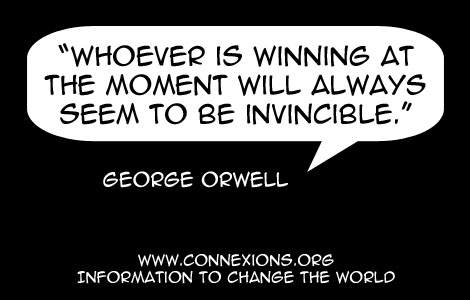
Your support is needed to keep Connexions going
All of the work of the Connexions project is done by volunteers, but our expenses include rent, phone and computer costs and technical support, as well as expenses related to our ongoing project of converting printed archival materials into digital formats. You can make a one time or regular monthly contribution through the donate page on the Connexions website.
Bequests
Many of us have made working for social justice a lifetime commitment. If you are thinking about leaving a legacy for social justice that will live on, you might want to consider leaving a bequest to Connexions in your will. If you'd like to discuss this option, please contact us or see the Bequest page.

